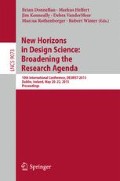Abstract
Design efforts on innovative IS artifacts are increasingly taking place in agile, small, and specialized long-tail communities supported by academic research. Long-tail communities need to reflect and develop awareness for the success of community-specific IS (CIS) artifacts in their particular practice context in an ongoing manner. In community-oriented DSR, researchers participate as active community members contributing CIS success awareness with the help of CIS success models resulting from ongoing CIS evaluation. However, CIS success awareness is challenging to achieve compared to organizational IS due to diversity, dynamicity, informal structures and permeable boundaries. In this paper, we emphasize the benefits of ongoing CIS success awareness with the help of custom-tailored CIS success models in community-oriented DSR contexts. We demonstrate our approach in a longitudinal case study of designing and evaluating therapeutic tools in an aphasia community.
Access this chapter
Tax calculation will be finalised at checkout
Purchases are for personal use only
Preview
Unable to display preview. Download preview PDF.
References
Anderson, C.: The Long Tail: Why the future of business is selling less of more. Hyperion, New York (2006)
Ballantine, J., Bonner, M., Levy, M., Martin, A., Munro, I., Powell, P.L.: The 3-D Model of Information Systems Success: the Search for the Dependent Variable Continues. Information Resources Management Journal 9(4), 5–14 (1996)
Brynjolfsson, E.: The Productivity Paradox of Information Technology. Communications of the ACM 36(12), 66–77 (1993)
Burton-Jones, A., Straub, D.W.: Reconceptualizing System Usage: An Approach and Empirical Test. Information Systems Research 17(3), 228–246 (2006)
Chaudhuri, S., Dayal, U., Narasayya, V.: An Overview of Business Intelligence Technology. Communications of the ACM 54(8), 88–98 (2011)
Damasio, A.R.: Aphasia. New England Journal of Medicine 326(8), 531–539 (1992)
Delone, W.H., McLean, E.R.: Information Systems Success: The Quest for the Dependent Variable. Information Systems Research 3(1), 60–95 (1992)
Delone, W.H., McLean, E.R., Sedera, D.: Future of Information Systems Success: Opportunities and Challenges. In: Topi, H., Tucker, A. (eds.) Computing Handbook, 3rd edn. Information Systems and Information Technology, pp. 70: 1–19. CRC Press (2014)
Devaraj, S., Kohli, R.: Performance Impacts of Information Technology: Is Actual Usage the Missing Link? Management Science 49(3), 273–289 (2003)
Diamantopoulos, A., Siguaw, J.A.: Formative Versus Reflective Indicators in Organizational Measure Development: A Comparison and Empirical Illustration. British Journal of Management 17(4), 263–282 (2006)
Diamantopoulos, A., Winklhofer, H.M.: Index Construction with Formative Indicators: An Alternative to Scale Development. Journal of Marketing Research 38(2), 269–277 (2001)
Gable, G.G., Sedera, D., Chan, T.: Re-conceptualizing Information System Success: the IS-Impact Measurement Model. Journal of the Association of Information Systems 9(7), 377–408 (2008)
Gregor, S., Hevner, A.R.: Positioning and Presenting Design Science Research for Maximum Impact. MIS Quarterly 37(2), 337–355 (2013)
Iriberri, A., Leroy, G.: A Life-Cycle Perspective on Online Community Success. ACM Computing Surveys 41(2), 1–29 (2009)
Jarvis, C.B., Mackenzie, S.B., Podsakoff, P.M.: A Critical Review of Construct Indicators and Measurement Model Misspecication in Marketing and Consumer Research. Journal of Consumer Research 30, 199–218 (2003)
Leimeister, J.M., Sidiras, P., Krcmar, H.: Success Factors of Virtual Communities from the Perspective of Members and Operators: An Empirical Study. In: HICSS 2004: Proceedings of the Proceedings of the 37th Annual Hawaii International Conference on System Sciences (HICSS 2004) - Track 7, p. 70194–1. IEEE Computer Society, Washington, DC (2004)
Moore, G.C., Benbasat, I.: Development of an Instrument to Measure the Perceptions of Adopting an Information Technology Innovation. Information Systems Research 2(3), 192–222 (1991)
Mustaquim, M.M., Nyström, T.: Designing information systems for sustainability – the role of universal design and open innovation. In: Tremblay, M.C., VanderMeer, D., Rothenberger, M., Gupta, A., Yoon, V. (eds.) DESRIST 2014. LNCS, vol. 8463, pp. 1–16. Springer, Heidelberg (2014)
Sein, M.K., Henfridsson, O., Purao, S., Rossi, M., Lindgren, R.: Action Design Research. MIS Quarterly 35(1), 37–56 (2011)
Spaniol, M., Springer, L., Klamma, R., Jarke, M.: SOCRATES: Barrier Free Communities of Aphasics on the Internet. In: Miesenberger, K., Klaus, J., Zagler, W.L., Burger, D. (eds.) ICCHP 2004. LNCS, vol. 3118, pp. 1024–1031. Springer, Heidelberg (2004)
Straub, D.W., Hoffman, D.L., Weber, B.W., Steinfield, C.: Measuring e-Commerce in Net-Enabled Organizations: An Introduction to the Special Issue. Information Systems Research 13(2), 115–124 (2002)
Venable, J., Pries-Heje, J., Baskerville, R.: A Comprehensive Framework for Evaluation in Design Science Research. In: Peffers, K., Rothenberger, M., Kuechler, B. (eds.) DESRIST 2012. LNCS, vol. 7286, pp. 423–438. Springer, Heidelberg (2012)
Wenger, E.: Communities of Practice: Learning, Meaning, and Identity. Learning in doing. Cambridge University Press, Cambridge (1998)
Author information
Authors and Affiliations
Corresponding author
Editor information
Editors and Affiliations
Rights and permissions
Copyright information
© 2015 Springer International Publishing Switzerland
About this paper
Cite this paper
Renzel, D., Klamma, R., Jarke, M. (2015). IS Success Awareness in Community-Oriented Design Science Research. In: Donnellan, B., Helfert, M., Kenneally, J., VanderMeer, D., Rothenberger, M., Winter, R. (eds) New Horizons in Design Science: Broadening the Research Agenda. DESRIST 2015. Lecture Notes in Computer Science(), vol 9073. Springer, Cham. https://doi.org/10.1007/978-3-319-18714-3_33
Download citation
DOI: https://doi.org/10.1007/978-3-319-18714-3_33
Publisher Name: Springer, Cham
Print ISBN: 978-3-319-18713-6
Online ISBN: 978-3-319-18714-3
eBook Packages: Computer ScienceComputer Science (R0)

